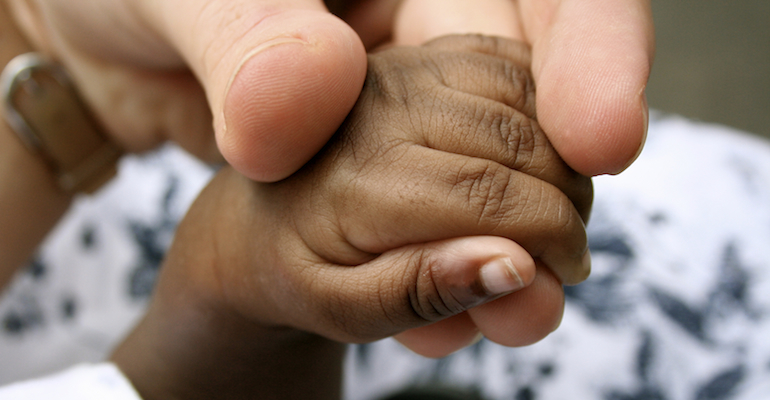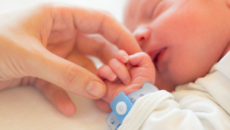Everyone, even the most experienced parent, has questions about newborn care. Newborn basics are included in most childbirth classes, but there are few classes for those who adopt. So, if you’re a newbie at caring for a newborn, here’s what you need to be prepared and to keep your baby comfortable the first month.
Feeding
What to expect: Feed your baby as much as he wants each time he wakes and seems hungry. Bottle-fed babies usually want to eat every three to five hours. Don’t be surprised if he spits up regularly — almost all babies do.
What to do: Bottle-feed newborns a standard infant formula recommended by your child’s health care professional. Be sure to choose one that is iron-fortified since iron is critical the first year. (It does not cause constipation, as commonly thought.) Hold your baby in your arms as you feed; don’t prop the bottle for him or give it to him in bed. See the doctor if he spits up excessively or has gas.
Sleeping
What to expect: Newborns tend to be awake only for meals, and may sleep 18-22 hours daily.
What to do: After providing food or comfort, let him drift off to sleep in his crib. To prevent Sudden Infant Death Syndrome (SIDS), a newborn should sleep on his back. Keep the crib clear of all loose items, including blankets.
Irregular Breathing
What to expect: Many newborns have irregular breathing patterns — breathing quickly, then slowly.
What to do: See the doctor immediately if a baby is panting to breathe, unable to feed, or his lips or fingers are turning blue.
Upper Respiratory Infections
What to expect: This is common and not harmful. Infants can develop nasal congestion, particularly in environments that are cold and dry.
What to do: Most physicians do not recommend cold medications for children younger than six months old. Instead, keep his nose moist by using a room humidifier. Elevate his head while he sleeps by propping up his bassinet or crib mattress, or have him sleep in his car seat (strapped in, of course).
Fever
What to expect: Hot, flushed skin, feeding difficulties, irritability, or sleeping too much or too little can be signs of a fever.
What to do: The only reliable way to take a newborn’s temperature is rectally. The normal rectal temperature of a newborn is 99.6 degrees Fahrenheit. See the doctor if your child is less than 28 days old and has a temperature over 100 degrees.
Umbilical Cord
What to expect: Newborns generally leave the hospital with their umbilical cords attached. After the cord falls off, three to 14 days later, it’s not unusual to see slight bleeding in the area for a week or two.
What to do: Keep the area clean and dry. See the doctor if the skin around the cord site is red and inflamed — this could be a sign of infection.
Bowel Movements
What to expect: Most newborns will have multiple bowel movements daily. They will initially be thick and dark. Once feeding starts, stools become looser and yellowish or greenish, often happening after each feeding.
What to do: Stools should be loose, rather than hard. See the doctor if the baby has diarrhea or if passing stools seems to be uncomfortable.



